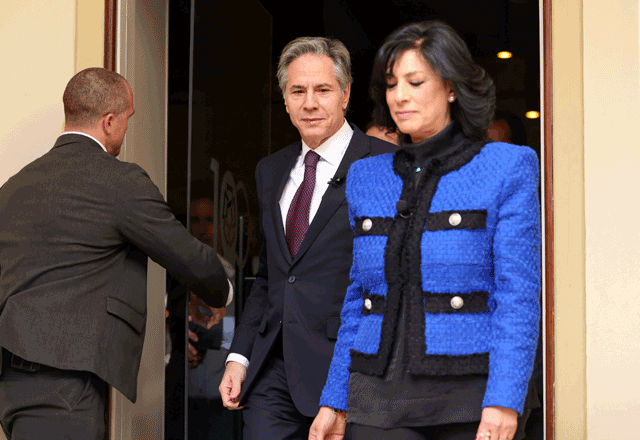You are here
Lecture reflects on changes in US role in Mideast
By Saeb Rawashdeh - Oct 04,2022 - Last updated at Oct 04,2022

Professor Marc Lynch talks about new doctrines of the US foreign policy on Monday at Columbia Global Centres in Amman (Photo of Saeb Rawashdeh)
AMMAN — Discussing the way things look from Washington’s perspective, Professor Marc Lynch from The George Washington University said that President Joe Biden and his administration feel good about the current situation in the Middle East.
“They came in with a couple of big things they wanted to do. First, they tried to fix the failures of the Trump’s administration and de-escalate crisis in the region,” Lynch said at the talk “America and the Middle East”, held on Monday at the Columbia Global Centre in Amman, adding that the new administration has tried to normalise relations between various regional players.
Biden has also tried to overcome divisions between the US and their longstanding Middle East allies.
“One thing that they think the previous administration did well was the Abraham Accords, and they continue working on normalisation between Israel and different Arab states,” Lynch pointed out, noting that the Biden team wanted to bring back the nuclear deal with Iran, but failed.
Building a functional regional order in which Arab states would cooperate with Western political centres and isolate Iranian influence has remained the main goal of each US administration.
“From Bush administration onward, the US was overinvested in the Middle East,” said Lynch, noting that US pundits want to get the country out of regional conflicts and interventions, but without an American political retreat.
However, the current problem lies in the policymakers of the Democratic Party, who were part of Bill Clinton’s administration when “the unilateral world was at its peak”, he said, adding that now, 30 years later, the US is facing challenges in Ukraine and with a growing Chinese influence.
“The new norm of the US military presence in the Middle East after 1991 was a direct result of the collapse of the Soviet Union,” Lynch said, adding that “now we don’t live in the world of uncontested US primacy”.
The world has not yet reached the classical understanding of multipolarity, but it is shifting towards that scenario, noted Lynch, adding that there is not yet a competitor that would push the US from the Middle East and take its position.
“China could and should be a competitor with the US in the world,” he said, noting that there is no political interest for a new, large conflict in the Middle East in which the US would take part.
Lynch also noted that the US cannot replicate its former position in the region at this stage.
“The US doesn’t have the capacity at the global level to mobilise,” Lynch said, adding that Biden’s team stands unable to restart the peace process between Israel and Palestinians.
Related Articles
The New Arab Wars: Uprisings and Anarchy in the Middle EastMarc LynchNew York: Public Affairs, 2016PP.
AMMAN — The University of Jordan (UJ) and the Australian embassy on Tuesday discussed means to enhance academic and cultural cooperation, an
CAIRO — US Secretary of State Antony Blinken arrived Sunday in Egypt at the start of a Middle East trip on which he will look to notch down



















